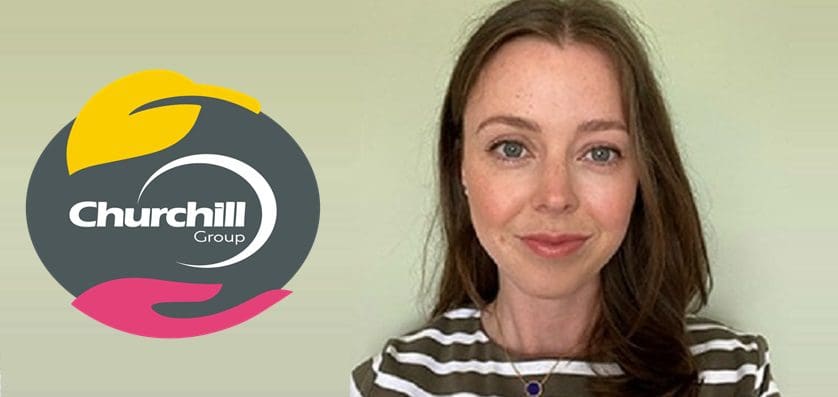Hannah Dales has just joined Churchill as our new group environment manager. We sat down with her to find out more about her experience and what she hopes to achieve in her role.
Interviewer: Hi Hannah! How are you today?
Hannah: I’m great, thanks for asking me to chat about this.
I: Of course! Please tell me a little bit about your background in the environment and why you pursued that as a career path?
H: Ever since I was quite young, I’ve always been interested in the environment and the impact we have on it. When I went to university, I studied environmental sciences with the intention of pursuing a career in this industry. My first job was as an air quality consultant. I did that for a few years. It was all things pollution and emissions and I really loved it. But, while it was interesting, it was extremely technical and I spent a lot of time looking at spreadsheets. I wanted to work in a more varied environment, and so I went to work for HS2, in their environment team. I worked there for seven years as an environment adviser, and then as an environment manager, overseeing every environmental aspect of the design and construction for the largest new railway station ever built in the UK, Old Oak Common. I see my new role as a fantastic opportunity for me to take a leading part in shaping the environmental strategy of an organisation. There are so many more avenues that Churchill can and wants to explore to make environmental improvements, it’s an exciting challenge!
I: Sounds good. So, what has brought you to Churchill as the new environment manager?
H: I’d been in my last job for a long time, and it was time for me to move on and take on that next challenge career-wise. I found the job description interesting, it’s obviously a very wide-ranging role but it sounded great, and I could tell that Churchill takes the environment and ESG seriously. In my interviews with Chris Williams, Churchill Group’s QHSE+S Director, I got a great sense of the company culture. It’s obviously quite a fast-paced place to work and that really appealed to me. Working on a large, government-led project was great but it came with its own set of frustrations. Joining Churchill is an opportunity to do something completely different. There’s a very can-do attitude here, and that’s exciting.
I: Yeah, definitely. What do you think of Churchill’s current sustainability agenda, such as being signed up to the Sustainable Facilities Management Index? They have lots of sustainable products and won the Ecovadis silver award; how would you say they’re doing?
H: There’s so much good stuff going on in Churchill! I’ve only been here a short time, but I’ve met so many people and everyone’s got great ideas and enthusiasm for sustainability. The challenge for me is trying to draw all these ideas together and form a level of consistency between different areas of the business, as well as working on a better understanding of our carbon footprint. We’ve got a good understanding of scope one and two emissions, but scope three is not something that we have a good grasp on, so my focus moving forward will be on that and how we turn it into actions and map out our journey to net zero.
I: That leads on to my next question. What would you like to bring to the sustainability strategy that maybe you haven’t already seen?
H: I’m conscious that I’ve only been in the business a short while, so it’s a difficult one to answer. I think Churchill is such a unique organisation, I don’t think there is one answer. What I want to do initially is to observe, see where we are, and see where the opportunities lie. As I mentioned, my key focus over the coming months will be to map out a net zero action plan, to fully understand and validate our carbon footprint, and set some actions and targets for the business to drive our net zero agenda. This will underpin and be the focus of our strategy, and will build on the foundations already in place. I always like to think of the 80:20 rule and prioritise those actions which have the biggest potential impact.
I: What do you think is the best sustainability-based achievement that we’ve made as a planet this far? I’m just interested in your opinion as you’re someone who’s worked in this area for so long.
H: As a planet? Wow, that’s big. I think that from my perspective and the agenda that I’ve seen change throughout my career, it’s regulation leading to environmental impacts being taken seriously in the corporate world. I say this because it’s really driving improvements. I think this is partly why I’m attracted to my job too. But there’re so many different possible answers to that question!
I: My final question is: what do you think the future of the environment and sustainability is?
H: As an industry, it’s growing. I mean, look at COP26 from last year. I think that cemented ESG as something that is going to be high on companies’ agendas for a very long time. And it’s only going to get higher as we near 2050, the date by which the UK has committed to net zero. It’s a great industry to work in at the moment. The future of our environment is another thing. I mean, as we chat, it’s boiling. There’s a question, is that normal? I know it’s lovely for us, but that’s where we are as a planet now, isn’t it? Climate change is a reality. I try not to think too much about the future of the actual environment, and instead focus on what I can do about it.
I: Thank you for having this chat with us Hannah! It was really insightful.
H: Thank to you! I can’t wait to carry on getting stuck in at Churchill.



